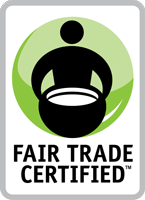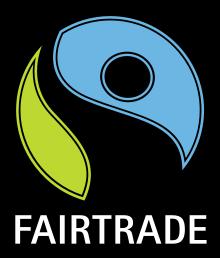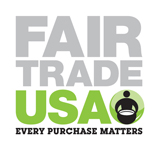| Look up fair trade or fairtrade in Wiktionary, the free dictionary. |
Fair trade is a social movement to help producers in developing countries achieve better trading conditions.

Fair trade is an institutional arrangement designed to help producers in developing countries achieve better trading conditions. Members of the fair trade movement advocate the payment of higher prices to exporters, as well as improved social and environmental standards. The movement focuses in particular on commodities, or products which are typically exported from developing countries to developed countries, but also consumed in domestic markets most notably handicrafts, coffee, cocoa, wine, sugar, fresh fruit, chocolate, flowers and gold. The movement seeks to promote greater equity in international trading partnerships through dialogue, transparency, and respect. It promotes sustainable development by offering better trading conditions to, and securing the rights of, marginalized producers and workers in developing countries. Fair trade is grounded in three core beliefs; first, producers have the power to express unity with consumers. Secondly, the world trade practices that currently exist promote the unequal distribution of wealth between nations. Lastly, buying products from producers in developing countries at a fair price is a more efficient way of promoting sustainable development than traditional charity and aid.
Fairtrade or fair trade may also refer to:
- Fair trade law, a law in the United States permitting manufacturers to specify a minimum retail price
- Fair Trade Certified Mark
- Fair trade certification
- Fairtrade certification, a widespread standard for labelling products produced by fair trade, overseen by FLO International
- Fairtrade Labelling Organizations International
- FLO International, Fairtrade International
- FLOCert
- Office of Fair Trading
- Trade justice, efforts to counteract unfair consequences of globalisation and of free trade
- "Fair Trade" (Land of the Lost), an episode of the 1974 television series
- "Fair Trade" (Star Trek: Voyager), an episode of the television series
A fair trade law was a statute in any of various states of the United States that permitted manufacturers the right to specify the minimum retail price of a commodity, a practice known as "price maintenance". Such laws first appeared in 1931 during the Great Depression in the state of California. They were ostensibly intended to protect small businesses to some degree from competition from very large chain stores during a time when small businesses were suffering. Many people objected to this on the grounds that if the manufacturers could set the price, consumers would have to pay more even at large discount stores. The complexity of the market also made the enforcement of these laws almost impractical. As the chain stores became more popular, and bargain prices more common, there was a widespread repeal of the laws in many jurisdictions. By 1975, the laws had been repealed completely

The Fair Trade Certified Mark is a fair trade certification mark used primarily in the United States and Canada. It appears on products as an independent guarantee that disadvantaged producers in the developing world are getting a better deal. The Fair Trade Certified Mark is the North American equivalent of the International Fairtrade Certification Mark used in Europe, Africa, Asia, Australia and New Zealand.

A fair trade certification is a product certification within the market-based movement fair trade. The most widely used fair trade certification is FLO International's, the International Fairtrade Certification Mark, used in Europe, Africa, Asia, Australia and New Zealand. Fair Trade Certified Mark is the North American equivalent of the International Fairtrade Certification Mark. As of January 2011, there were over 1000 companies certified to the FLO International's certification and a further 1000 or so certified to other ethical and fairtrade certification schemes around the world.






